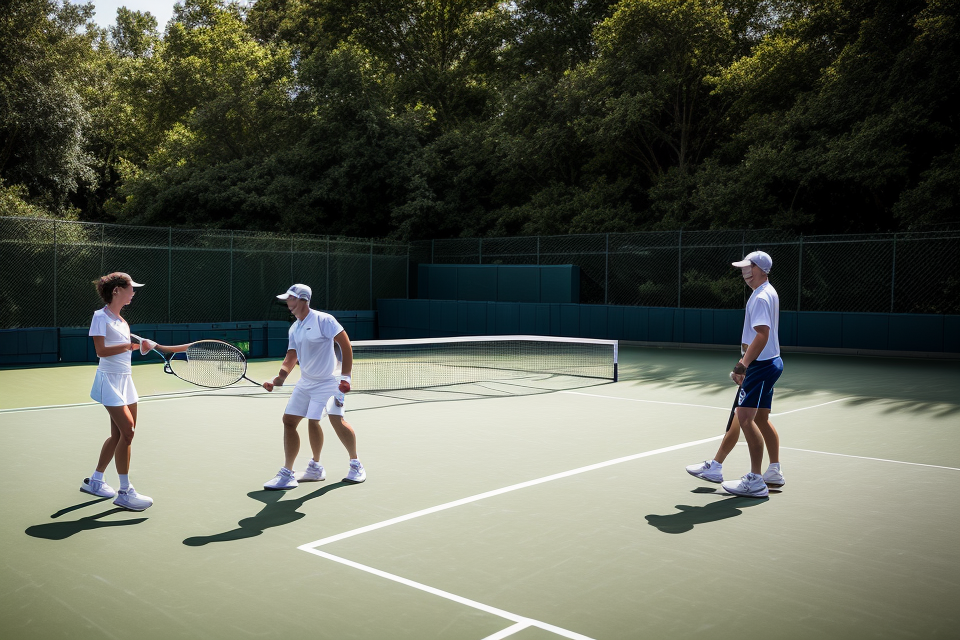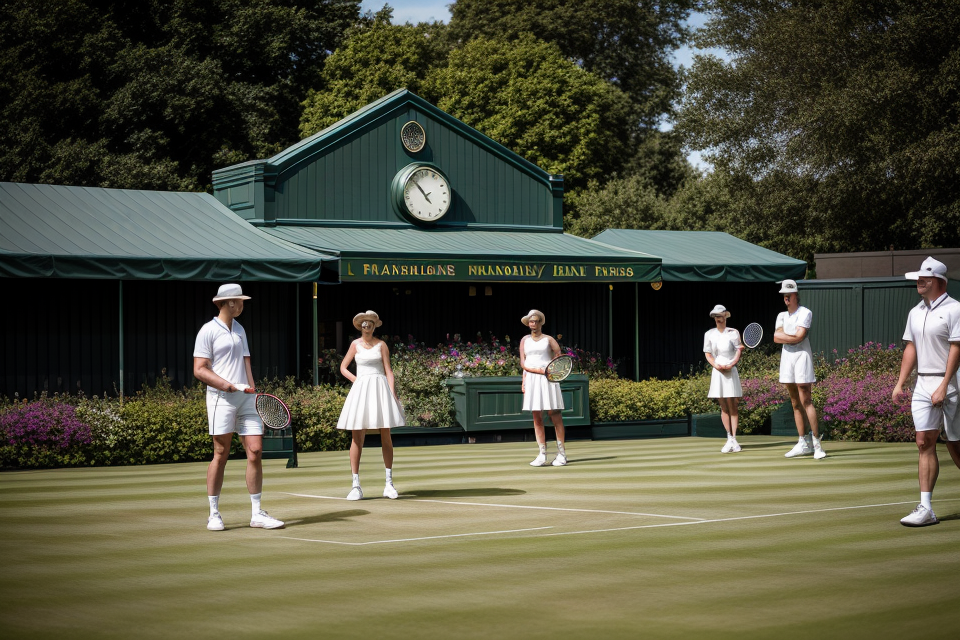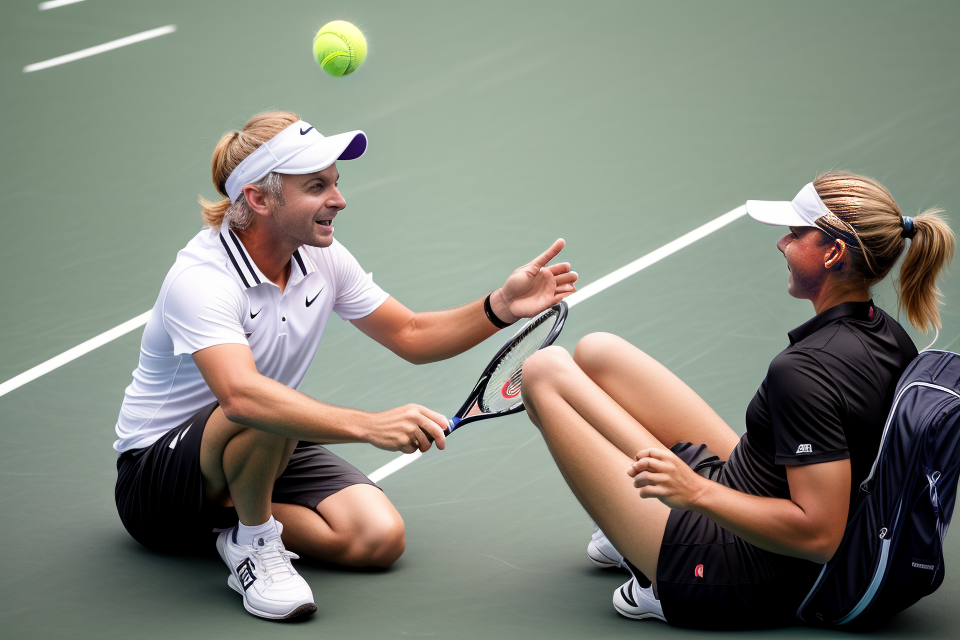Tennis coaching is the process of receiving guidance and instruction from a trained professional in order to improve one’s skills and performance on the tennis court. Whether you’re a beginner looking to learn the basics or a seasoned player seeking to fine-tune your game, tennis coaching can provide you with the tools and techniques needed to achieve your goals. From improving your stroke mechanics to developing your strategic thinking, a good coach can help you take your game to the next level. In this article, we’ll explore the ins and outs of tennis coaching, including what to look for in a coach, how to get the most out of your lessons, and tips for mastering the art of tennis. So grab your racquet and let’s get started!
The Importance of Tennis Coaching
What is Tennis Coaching?
Tennis coaching refers to the process of providing guidance and instruction to individuals or groups who are looking to improve their skills and performance in the sport of tennis. It involves working with a trained professional who has expertise in the techniques, strategies, and physical demands of the game.
Definition of Tennis Coaching
Tennis coaching is a specialized form of coaching that focuses on the technical, tactical, physical, and mental aspects of the sport. It is designed to help players of all levels, from beginners to advanced, to develop their skills and improve their overall performance on the court.
Different Types of Tennis Coaching
There are several different types of tennis coaching available, including:
- Private lessons: One-on-one instruction with a coach that is tailored to the individual needs and goals of the player.
- Group lessons: Coaching sessions that involve a group of players, usually with a similar skill level, working together to improve their skills.
- Semi-private lessons: Similar to private lessons, but with a small group of players working with one coach.
- Clinics: Coaching sessions that are typically shorter in duration and focus on specific aspects of the game, such as serve or volley.
Benefits of Tennis Coaching
The benefits of tennis coaching are numerous, including:
- Improved technique: A coach can help players develop proper technique, which can lead to improved performance and reduced risk of injury.
- Enhanced strategy: A coach can help players understand the strategic aspects of the game, including how to position themselves on the court and how to approach different situations.
- Increased confidence: As players improve their skills and learn new techniques, they may experience increased confidence on the court, which can translate into better performance.
- Customized training: A coach can tailor training sessions to meet the individual needs and goals of the player, ensuring that they are working on the areas that will have the greatest impact on their performance.
- Fitness training: Many coaches also offer fitness training, which can help players improve their strength, endurance, and overall physical fitness.
Overall, tennis coaching is an essential component of achieving success in the sport. It provides players with the guidance and instruction they need to improve their skills, develop effective strategies, and achieve their goals on the court.
Why Tennis Coaching Matters
Tennis coaching is an essential aspect of the sport that cannot be overlooked. It is the process of receiving guidance and instruction from a trained professional who specializes in teaching the game of tennis. Tennis coaching matters for several reasons, which are outlined below:
- Improving skills and techniques: One of the primary reasons why tennis coaching matters is that it helps players improve their skills and techniques. A coach can provide valuable feedback on a player’s technique, help them identify areas for improvement, and offer tips on how to correct any flaws. This guidance can help players become more proficient in their strokes, footwork, and overall game.
- Enhancing physical and mental fitness: Tennis is a physically demanding sport that requires both physical and mental fitness. A coach can help players develop a training program that will improve their physical fitness, including their strength, endurance, and agility. Additionally, a coach can also help players develop the mental toughness and resilience needed to perform at their best under pressure.
- Building confidence and self-esteem: Tennis is a sport that requires a great deal of mental fortitude. A coach can help players build their confidence and self-esteem by providing positive feedback, encouraging them to take risks, and helping them overcome any fears or doubts they may have. Confidence and self-esteem are crucial for success in any sport, and tennis is no exception.
- Achieving success in competitions: Finally, tennis coaching matters because it can help players achieve success in competitions. A coach can help players develop a strategy for winning, provide guidance on how to handle different game situations, and help them prepare mentally and physically for competition. With the right coaching, players can develop the skills and confidence needed to excel in tournaments and competitions.
Finding the Right Tennis Coach
Qualities to Look for in a Tennis Coach
When it comes to finding the right tennis coach, it’s important to consider a few key qualities that will help ensure a successful and rewarding coaching relationship. Here are some of the most important qualities to look for in a tennis coach:
- Experience and credentials: A coach’s experience and credentials can give you a good idea of their level of expertise and knowledge of the sport. Look for coaches who have played at a high level, have coached other players to success, and have a strong understanding of the game.
- Teaching style and methodology: Every coach has their own unique teaching style and methodology, so it’s important to find one that matches your learning style and goals. Some coaches may focus on technical aspects of the game, while others may take a more holistic approach that includes mental and physical training.
- Communication and interpersonal skills: Good communication and interpersonal skills are essential for any coach-player relationship. Look for coaches who are able to communicate clearly and effectively, who are patient and supportive, and who are able to build a strong rapport with their players.
- Availability and commitment: Finally, it’s important to find a coach who is available for regular sessions and who is committed to helping you achieve your goals. Look for coaches who are flexible with their schedules and who are willing to work with you to create a customized training program that meets your needs.
Questions to Ask Before Hiring a Tennis Coach
When it comes to finding the right tennis coach, it’s important to ask the right questions to ensure that you’re making the best decision for your needs. Here are some key questions to ask before hiring a tennis coach:
What is your coaching philosophy?
It’s important to understand a coach’s overall approach to coaching and what they believe are the key elements of a successful player. Some coaches may prioritize technical skill, while others may focus more on mental toughness or physical conditioning. Make sure the coach’s philosophy aligns with your own goals and preferences.
What is your approach to teaching beginners/intermediate/advanced players?
Different coaches may have different approaches when it comes to teaching players at different skill levels. Some coaches may specialize in working with beginners, while others may be better suited for advanced players. Make sure the coach’s approach is tailored to your current skill level and goals.
How do you tailor your coaching to each student’s needs?
Every player is unique, and a good coach should be able to adapt their coaching style to meet the individual needs of each student. Ask the coach how they tailor their coaching to each student’s strengths, weaknesses, and goals.
What is your schedule and availability?
Make sure the coach’s schedule and availability align with your own. If you need regular lessons or practice sessions, make sure the coach is available at times that work for you. Additionally, ask about the coach’s availability for tournaments or other events if that’s something you’re interested in pursuing.
Tips for Choosing the Right Tennis Coach for You
Choosing the right tennis coach is crucial to achieving your goals and improving your skills on the court. Here are some tips to help you find the perfect coach for you:
- Assessing your goals and objectives
Before you start looking for a coach, it’s important to assess your goals and objectives. Are you looking to improve your overall game, or do you have specific areas that you want to work on? Once you have a clear idea of what you want to achieve, you can look for a coach who specializes in those areas. - Considering your budget and schedule
Tennis coaching can be expensive, so it’s important to consider your budget before you start looking for a coach. Set a realistic budget and look for coaches who fit within that range. Additionally, consider your schedule and find a coach who can work with you at a time that is convenient for you. - Evaluating your compatibility with the coach
It’s important to find a coach who is compatible with your personality and coaching style. You will be spending a lot of time with your coach, so it’s important to find someone who you can work well with. Consider meeting with the coach before you commit to working with them to ensure that you are compatible. - Seeking recommendations and referrals
Ask for recommendations and referrals from other tennis players or organizations. This can be a great way to find a coach who has a proven track record of success. Additionally, you can also check online reviews and ratings to get an idea of the coach’s reputation.
By following these tips, you can find the right tennis coach to help you achieve your goals and improve your skills on the court.
Building a Successful Coach-Student Relationship
Setting Expectations and Goals
Establishing Clear Objectives and Milestones
In order to achieve success in tennis, it is important to establish clear objectives and milestones. These objectives should be specific, measurable, attainable, relevant, and time-bound (SMART). For example, a student’s objective may be to improve their serve accuracy by 10% within the next month. This objective is specific, measurable, attainable, relevant, and time-bound.
Developing a Plan for Progress and Improvement
Once the objectives and milestones have been established, it is important to develop a plan for progress and improvement. This plan should outline the steps that will be taken to achieve the objectives and milestones. It should also include a timeline for progress and a system for tracking progress.
Setting Realistic Timelines and Deadlines
It is important to set realistic timelines and deadlines for achieving the objectives and milestones. This will help to ensure that progress is made in a timely manner and that the student remains motivated and focused. However, it is also important to be flexible and willing to adjust the timeline or deadline if necessary.
In summary, setting expectations and goals is a crucial part of building a successful coach-student relationship in tennis. By establishing clear objectives and milestones, developing a plan for progress and improvement, and setting realistic timelines and deadlines, the student will be able to achieve their goals and improve their tennis skills.
Communication and Feedback
Effective communication and feedback are essential components of a successful coach-student relationship in tennis. Here are some key points to consider:
Open and honest communication
Open and honest communication is crucial in any relationship, including the coach-student relationship in tennis. A coach should be approachable and willing to listen to their student’s concerns, ideas, and suggestions. On the other hand, a student should be open to constructive criticism and feedback from their coach. Both parties should feel comfortable expressing themselves without fear of judgment or retribution.
Providing constructive feedback and criticism
Constructive feedback and criticism are important for a student’s growth and development in tennis. A coach should provide specific and actionable feedback that focuses on the student’s strengths and weaknesses. It’s important to offer praise for good performances and to highlight areas where improvement is needed. Constructive criticism should be delivered in a positive and supportive manner, emphasizing the student’s potential for growth and improvement.
Seeking clarification and guidance
Communication is a two-way street, and it’s important for both the coach and the student to seek clarification and guidance when needed. A student should feel comfortable asking questions and seeking clarification on technique, strategy, or any other aspect of their game. A coach should be willing to provide guidance and support, and to help the student understand the reasoning behind their feedback and criticism.
In summary, effective communication and feedback are essential for building a successful coach-student relationship in tennis. By focusing on open and honest communication, providing constructive feedback and criticism, and seeking clarification and guidance, both the coach and the student can work together to achieve their goals and improve their skills on the court.
Building Trust and Rapport
- Demonstrating commitment and dedication
A successful coach-student relationship is built on trust and rapport. One of the key elements of building trust and rapport is demonstrating commitment and dedication. This means being reliable, consistent, and willing to go the extra mile for your student.
- Being responsive and accessible
Being responsive and accessible is another important aspect of building trust and rapport with your student. This means being available to answer questions, provide feedback, and offer support whenever your student needs it.
- Showing empathy and understanding
Showing empathy and understanding is also crucial in building trust and rapport with your student. This means being able to put yourself in your student’s shoes, understanding their struggles and challenges, and providing them with the support and guidance they need to overcome them.
By demonstrating commitment and dedication, being responsive and accessible, and showing empathy and understanding, you can build a strong coach-student relationship that is based on trust and rapport. This will help your student feel confident and comfortable working with you, and will ultimately lead to better results on the tennis court.
Enhancing Your Tennis Skills with Coaching
Improving Techniques and Strategies
- Developing effective strokes and footwork
- Mastering different shots and tactics
- Enhancing reaction time and agility
Developing Effective Strokes and Footwork
- Mastering the Fundamentals: A strong foundation in the basics of tennis is crucial for success on the court. A coach can help you develop the essential skills, such as grip, stance, and movement, that will serve as the building blocks for your game.
- Perfecting Technique: Through targeted drills and feedback, a coach can help you refine your strokes and footwork, ensuring that you are able to execute shots with precision and power.
- Building Muscle Memory: Repetition is key to developing muscle memory, which is essential for performing strokes and movements automatically and effectively. A coach can design drills that help you ingrain the correct techniques into your muscle memory, allowing you to perform at your best even under pressure.
Mastering Different Shots and Tactics
- Expanding Your Arsenal: A coach can help you expand your repertoire of shots and tactics, giving you the tools you need to outmaneuver your opponents and keep them off balance.
- Analyzing Opponents: A coach can also help you analyze your opponents’ strengths and weaknesses, allowing you to tailor your strategy to exploit their vulnerabilities and neutralize their threats.
- Making Adjustments: On the court, circumstances can change rapidly, and a coach can help you make adjustments to your game plan in real-time, ensuring that you are always one step ahead of your opponent.
Enhancing Reaction Time and Agility
- Quick Thinking: In tennis, reaction time is crucial, as it can mean the difference between winning and losing a point. A coach can help you develop your reflexes and improve your agility, giving you the edge you need to respond to your opponent’s shots and take control of the point.
- Coordination and Balance: A coach can also help you improve your coordination and balance, which are essential for maintaining your footing on the court and executing shots with precision.
- Flexibility and Mobility: A coach can design exercises and drills to improve your flexibility and mobility, helping you to move more freely and efficiently on the court, and reducing your risk of injury.
Physical and Mental Conditioning
When it comes to improving your tennis skills, physical and mental conditioning are crucial components that cannot be overlooked. These aspects of coaching are designed to help you build endurance and stamina, develop strength and flexibility, and improve your mental focus and resilience.
Building Endurance and Stamina
Endurance and stamina are essential for success in tennis. Coaching can help you build these attributes through various exercises and drills. For example, interval training, which involves alternating between periods of high-intensity exercise and periods of rest, can help you improve your cardiovascular fitness and endurance. Additionally, practicing drills that focus on footwork and agility can help you build the stamina needed to sustain high-level performance throughout a match.
Developing Strength and Flexibility
Physical strength and flexibility are also important for success in tennis. Coaching can help you develop these attributes through targeted exercises and stretches. For example, strength training exercises such as weightlifting and resistance band work can help you build the muscular strength needed to hit with power and control. Additionally, practicing yoga or Pilates can help you improve your flexibility and balance, which are essential for maintaining proper form and preventing injury.
Improving Mental Focus and Resilience
Mental focus and resilience are critical for success in tennis. Coaching can help you improve these attributes through various techniques and exercises. For example, mindfulness meditation can help you develop a clear and focused mindset, while visualization exercises can help you build mental toughness and resilience in the face of adversity. Additionally, working with a sports psychologist can help you develop the mental skills needed to perform at your best under pressure.
Overall, physical and mental conditioning are essential components of coaching that can help you enhance your tennis skills and achieve success on the court. By working with a coach who can help you build endurance and stamina, develop strength and flexibility, and improve your mental focus and resilience, you can take your game to the next level and achieve your goals as a tennis player.
Overcoming Challenges and Obstacles
- Dealing with setbacks and failures
- Learning from mistakes
- Staying positive and motivated
- Managing stress and anxiety
- Developing mental toughness
- Using relaxation techniques
- Adapting to different playing conditions
- Playing in different weather conditions
- Adjusting to different court surfaces
Dealing with setbacks and failures is an inevitable part of any sport, and tennis is no exception. However, it is important to learn from these mistakes and use them as opportunities for growth and improvement. Staying positive and motivated despite setbacks can be challenging, but it is essential for long-term success in tennis.
Managing stress and anxiety is also a crucial aspect of tennis, as it can significantly impact performance on the court. Developing mental toughness and resilience can help players cope with the pressure of competition and perform at their best. Additionally, using relaxation techniques such as deep breathing and visualization can help reduce stress and anxiety.
Finally, adapting to different playing conditions is an important skill for tennis players to master. This includes playing in different weather conditions, such as hot and humid or cold and rainy, as well as adjusting to different court surfaces, such as clay or grass. Being able to adapt to these different conditions can give players a significant advantage over their opponents.
FAQs
1. What is tennis coaching?
Tennis coaching is the process of receiving professional guidance and instruction from a trained coach in order to improve one’s tennis skills and performance. It involves personalized training sessions, which can be conducted in group or individual settings, and can range from beginner to advanced levels.
2. Who can benefit from tennis coaching?
Anyone can benefit from tennis coaching, regardless of their age or skill level. Beginners can learn the basic techniques and rules of the game, while advanced players can work on improving their strategies, fitness, and mental toughness. Tennis coaching can also be beneficial for those who want to prepare for tournaments or simply enjoy playing tennis as a recreational activity.
3. What does a tennis coach do?
A tennis coach provides personalized instruction and guidance to help players improve their technical skills, physical fitness, mental toughness, and strategic thinking. They may conduct individual or group sessions, and can customize their coaching approach to meet the specific needs and goals of each player. A coach may also provide feedback on a player’s performance, offer tips for improvement, and help them develop a training regimen to achieve their goals.
4. How do I find a good tennis coach?
Finding a good tennis coach requires research and consideration. Look for coaches who have experience working with players at your skill level and have a proven track record of success. Check their credentials, certifications, and reviews from previous clients. You may also want to observe a coaching session or consult with other players to get a sense of their coaching style and effectiveness.
5. How often should I have tennis coaching sessions?
The frequency of tennis coaching sessions depends on your goals, schedule, and budget. Some players may benefit from daily or weekly sessions, while others may prefer less frequent coaching. It’s important to communicate with your coach to determine the best schedule for you and to ensure that you are making progress towards your goals.
6. How much does tennis coaching cost?
The cost of tennis coaching can vary widely depending on the coach’s experience, location, and services offered. Group sessions may be less expensive than private lessons, and some coaches may offer package deals or discounts for multiple sessions. It’s important to discuss costs with your coach upfront to avoid any surprises or misunderstandings.
7. What should I expect in a tennis coaching session?
In a tennis coaching session, you can expect to receive personalized instruction and feedback from your coach. They may demonstrate proper techniques, provide tips for improvement, and offer drills to practice specific skills. Depending on your goals and needs, your coach may also focus on physical conditioning, mental toughness, or strategic thinking. It’s important to communicate with your coach about your goals and expectations to ensure that you get the most out of your sessions.



